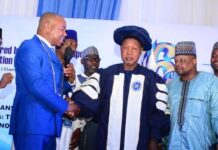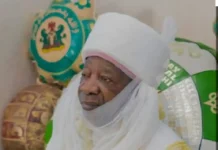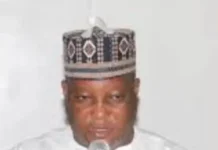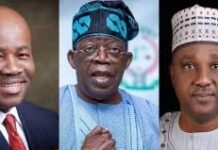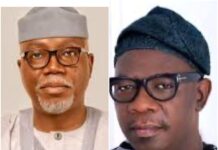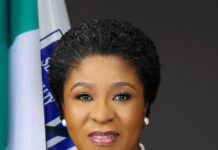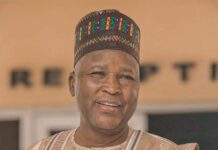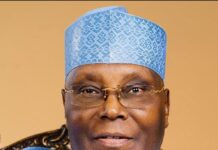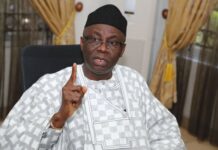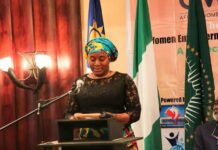COVID-19: Our Position On Edo, Ondo Governorship Election – INEC
POLITICS DIGEST – Amidst the uncertainty on how long the crisis arising from the Coronavirus pandemic in the country, National Commissioner and Chairman, Information and Voter Education Committee of the Independent National Electoral Commission (INEC), Mr Festus Okoye, speaks with NIGERIAN TRIBUNE on the activities of the commission in relation to the forthcoming Edo, Ondo governorship elections and proposal on electoral amendment, among other issues.
HOW has the INEC been coping with the challenges posed by Covid-19 pandemic since the commission always has a series of programmes based on its statutory functions?
Nigeria is navigating a complex, dangerous and unchartered terrain. The country is embroiled in existential war that affects the entire country and humanity. It is a war without boundaries and its effect and consequences defies ethnic, religious, cultural, class, gender and other boundaries. There is palpable fear, anxiety and confusion in the world. Social and economic activities are at a standstill in different parts of the world, including Nigeria. Hence, national attention and resources are focused at containing this novel virus that threatens our existence. The commission, as a public trust, is not immune to the challenges posed by COVID-19 and it has affected the conduct of some of the constitutional and statutory programs and activities of the commission.
As you are aware, in almost all the states of the federation and the Federal Capital Territory, all educational institutions have been closed, offices have been closed and almost all other public and private institutions have been closed. Businesses and markets have been closed while the boundaries of states have been shut and citizens have been ordered to remain in their houses. You will also recall that the commission issued a statement on the 23 March, 2020 suspending its regular activities”in view of the Coronavirus Pandemic and the preventive and containment measures put in place by the Federal and State Governments and in line with the advisory on social distancing from the World Health Organisation (WHO) and the Nigeria Centre for Disease Control (NCDC)”
In the said statement, the commission also stated that “effective from Tuesday 24 March, 2020, all regular and non-essential activities will be suspended in its headquarters and offices nation-wide for 14 days in the first instance” and that the ”regular quarterly meetings with stakeholders, namely: political parties, civil society organisations, the media, security agencies and all other meetings, have been suspended until such a time when normalcy returns.”
The commission also informed Nigerians that it would no longer monitor the conventions, congresses, conferences or meetings of political parties until further notice. Notwithstanding the challenges of this period, the commission continues to meet, via non-physical contact channels, while communication between the commission and its stakeholders remains open.
Is there special strategies the commission has developed in order to sustain regular interface and engagement with other major stakeholders and how?
The commission suspended the conduct of the four senatorial bye-elections in Nigeria; two in Bayelsa, and one each in Imo and Plateau states respectively based on the COVID-19 global pandemic. The commission has two major off season governorship elections in Edo and Ondo states in September and October 2020. The commission suspended the conduct of the senatorial bye- elections, based on its powers derived from section 26 of the Electoral Act, 2010 (as amended).
The moment normalcy returns to the country; the commission will issue the timetable and schedule of activities for the four senatorial bye- elections and possibly for the senatorial district vacancy that occurred in the Cross River North senatorial district. While the commission continues to interact with the key stakeholders in the electoral process, we believe that individual and institutional attention must be focused on shared synergy at returning the country to normalcy. Elections and the electoral process are about the people of Nigeria. Nigerians must remain alive to vote in an election and without the people no election can take place. It is more expedient, more strategic and more rational to focus national and institutional attention at degrading and halting the spread of COVID-19 and getting the country back to work and back to normalcy.
What are the specific programmes of the INEC that the sudden disruption occasioned by the pandemic affected?
Read Also:
The pandemic affected preparations for the conduct of four senatorial bye-elections in Bayelsa, Imo and Plateau states. The disruption affected and disrupted the National Dialogue on Elections that was billed to hold in March. The disruption will definitely affect the timelines for the amendment of the Electoral Act and the different Bills for the alteration of aspects of the constitution with bearing on the electoral process. But these are programs and timelines that are adjustable. The commission is virtually ready with its position, proposals and proposed amendments to the electoral framework and will interface with the National Assembly as soon as normalcy returns. All the National and Resident Electoral Commissioners, Directors and Heads of Departments of the commission are working on various projects and aspects of the electoral process under the leadership of the Chairman, Professor Mahmood Yakubu.
The governorship elections in Edo and Ondo states are gradually drawing nearer. With the seeming uncertainty on when the general distortions caused by Covid-19 will be resolved, what are the implications for INEC, which is mandated to monitor and supervise party primaries?
The commission will not succumb to induced panic relating to the conduct of Edo and Ondo governorship elections. The commission will not call off, postpone or adjust the timeline for the conduct of both elections when it has not issued the statutory notice evidencing commencement of activities and programs for both elections.
The commission released the Timetable and Schedule of Activities for the Edo and Ondo governorship election on February, 2020. By the said timetable and Schedule of Activities, the commission will give the statutory notice relating to the conduct of the Edo governorship election on the 1st day of June 2020 and that of Ondo State on the 1st day of July 2020. The conduct of party primaries, including the resolution of disputes arising from the primaries for the Edo governorship election, will take place between the 2nd to the 27th of June 2020 while that of Ondo State will commence on the 2nd day of July 2020 and end on the 25th day of July 2020. The implication is that those jostling for power and position are acting and playing outside the statutory timeframe and timelines for the commencement of activities relating to both elections.
It is our hope, our desire and prayer that the country will navigate out of the present pandemic before the statutory period prescribed for issuing Notice of Election for both governorship elections. The commission will rely on and act within the confines of the constitution and the Electoral Act in responding to the challenges posed to the electoral process by the present pandemic. We must realise that voting and participation in election is the exclusive preserve of those that are alive. The commission prepares for voters and the present pandemic is an existential challenge that requires national solidarity. The commission will definitely be ready with its own set of activities and programs as soon as the country normalises.
Is the commission in touch with stakeholders in the elections on the issue and possible options on the table to address other matters therein, why and how?
The only option on the table as at now is that the governorship election in Edo State will take place on the 19th day of September and that of Ondo State will take place on the 10th day of October 2020. The major stakeholders in the electoral process are aware of the constitutional and statutory stipulations relating to the conduct of the elections. They are aware of the timetable and schedule of activities issued by the commission. The commission is also preparing for the conduct of both elections as we have almost finalised our election project plan and budget for both elections.
The commission is part of the national effort at containing the present pandemic and will prefer undivided national attention on the pandemic. The country has the whole of April and May to navigate out of the present crisis and if anything changes in terms of the containment strategies, the constitution and the Electoral Act offers clear and unambiguous guidance on what should be done.
Has the Commission forwarded to the National Assembly proposal on electoral reforms after INEC’s engagement with various categories of stakeholders in Lagos and other places?
The commission is in continuous engagement with the leadership of the Senate Committee on INEC and that of the House Committee on Electoral Matters. The commission has underlined areas of agreement between the Committees and the commission, areas of partial agreement and contentious areas. The commission has almost finalised its proposals and will be ready with the document as soon as the National Assembly resumes.
What are the core recommendations therein and why?
The chairman of the Commission, Professor Mahmood Yakubu, will unveil the core recommendations of the commission. Some of the issues and recommendations will be finalised any moment from now. There is an agreement that the regime of internal party democracy must be strengthened, especially in the area of party nomination processes. There is agreement for the greater use of technology in the electoral process. There seems to be some agreement that the country should take a second look at the constitutional timelines for the resolution of electoral disputes. There is some agreement for stiffer penalty for electoral offenders. There is an agreement that the smart card reader and or other electronic devices for accreditation should be imputed into the Electoral Act. There is some agreement that the period for the registration and merger of political parties should be reviewed to afford newly registered parties and parties that merged sufficient time to build structures and campaign. We are confident that the collaborative partnership between the commission and the National Assembly will accelerate a seamless and less contentious and less rancorous passage of the proposed amendment.
Source: Nigerian Tribune






